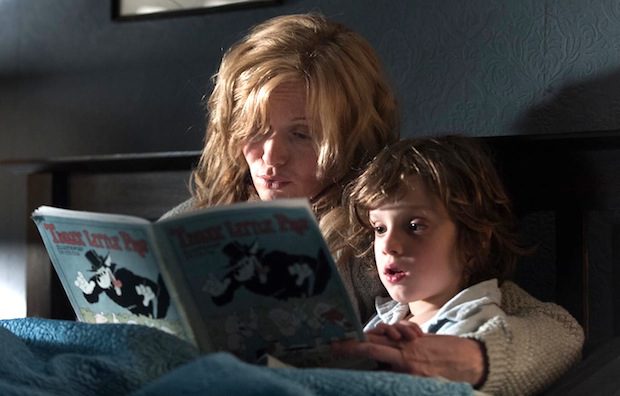Werewolves of Portland (Maine)

“The Babadook” is an Australian horror flick that will open on most screens in December. Essie Davis plays the mother and widow Amelia, whose husband died six years ago in an accident as they rushed to the hospital when birth was imminent. Noah Wiseman plays her 6-year-old son Samuel who was born that day. Essie gives what may be the finest female performance in a horror film that I have ever seen. Noah is by turns as endearing or as scary as the script demands. Director Jennifer Kent does a superb job of building the suspense slowly and steadily, giving us time to get to know and care about the two main characters.
Why, then, is “The Babadook” not my choice as the “one to see”? It’s not because there’s too much gore; it is actually rather restrained in that department by slasher film standards. It’s because no matter how much I liked the acting, I came down with an acute case of déjà vu. I kept remembering that I had seen all of this before—the maybe-she-is-maybe-she-isn’t seeming insanity of the mother, the rages, the knives in the kitchen, the knocks on the front door when nobody’s there, the thump-thumps in the walls, the swarming cockroaches, the strangled family dog, the creepy cellar, the characters being pulled by invisible forces against the walls or levitated into the air. If I’ve forgotten anything, the film hasn’t.
If you have never seen a horror film, “The Babadook” is a great one to see because of its exceptionally great acting. It will probably scare you because you’re a horror virgin. Otherwise, it’s your flip of the coin if you are already a horror film addict. It is undoubtedly better than anything you are likely to see this Halloween season.
“Faux Paws” succeeds in doing for its genre (the werewolf movie) what “The Babadook” fails at doing for horror. “Faux Paws” expands the boundaries of the genre to give us a fresh look at the world of werewolves, and it does so in a way that makes this a comedy rather than a horror film.
“Faux Paws,” you see, is a story of the road-trip adventures of two gay werewolves. Yes, you read that right. But don’t stop reading. No matter what your opinions are on homosexuality, this is not a case of ideology or sexual orientation political correctness being shoved at you. Rather the film uses a major current social preoccupation (homosexuality) to make us laugh. Of course, if you believe that homos should only be portrayed as dangerous sexual deviants, not as sort-of-normal human beings or sort-of-normal werewolves, you are probably not interested in humor.
When we first meet Brian (played by Brian Wimer) and Doug (played by Doug Bari), they are incarcerated in a lycanthrope detention facility. A bare-bones history at the beginning of the film lets us know that werewolves are no longer being killed in the U.S., only incarcerated, because it has been discovered that the saliva of werewolves has miraculous medicinal properties.
Doug and Brian are an older-younger odd couple, though I hesitate to call them “gay” since they are at each other’s throats much more often than they are lovey-dovey. It’s sort of as if Jack Lemmon and Walter Matthau (or Tony Randall and Jack Klugman in the TV series) were gay werewolf roommates.
We also learn along the way that Doug, the older one, is impotent. Only in terms of this absurdist movie, that means that he can no longer “change” when there’s a full moon. Therefore he concentrates on trying to keep his partner out of trouble during full moons.
Anyway, Brian and Doug manage to escape from the lycanthrope detention center. The road trip begins. Their goal is to reach Maine, the only U.S. state with a sanctioned tolerance of werewolves. I may be reading too much into this, but does that indicate a libertarian orientation on the part of the filmmaker? A conservative would have picked New Hampshire, a liberal or socialist would have picked Vermont, but neither would be appropriate. Maine is individualistic and iconoclastic in a way that defies followers of ideology. Also, there is the matter that the various police forces (and they are everywhere) never ask for your driver’s license as ID, but for your National Identity Card. Hmm, that’s a giveaway.
On the road to Maine, a substantial (and the funniest) part of the movie involves a stopover to see Brian’s family. He’s afraid that if he gets to Maine, he will never be able to see them again, and he’s very family oriented. This is not without tension for Brian. His family knows that he is a werewolf, and accepts that. But will they be able to accept his homosexuality, and the fact that Doug is as old as his father? Not to worry. Brian’s kin are a parody of hippiedom, and there are plenty of thrills and laughs as the bounty hunters and police close in on them at a full moon.
So, do Doug and Brian make it to Maine? I won’t give that away, except to say that this is one case where I hope there will be movie sequels, perhaps even a TV series in the works.
David Franke was one of the founders of the conservative movement in the 1950s and 1960s. He is the author of a dozen books, including Safe Places, The Torture Doctor, and America’s Right Turn.
Comments